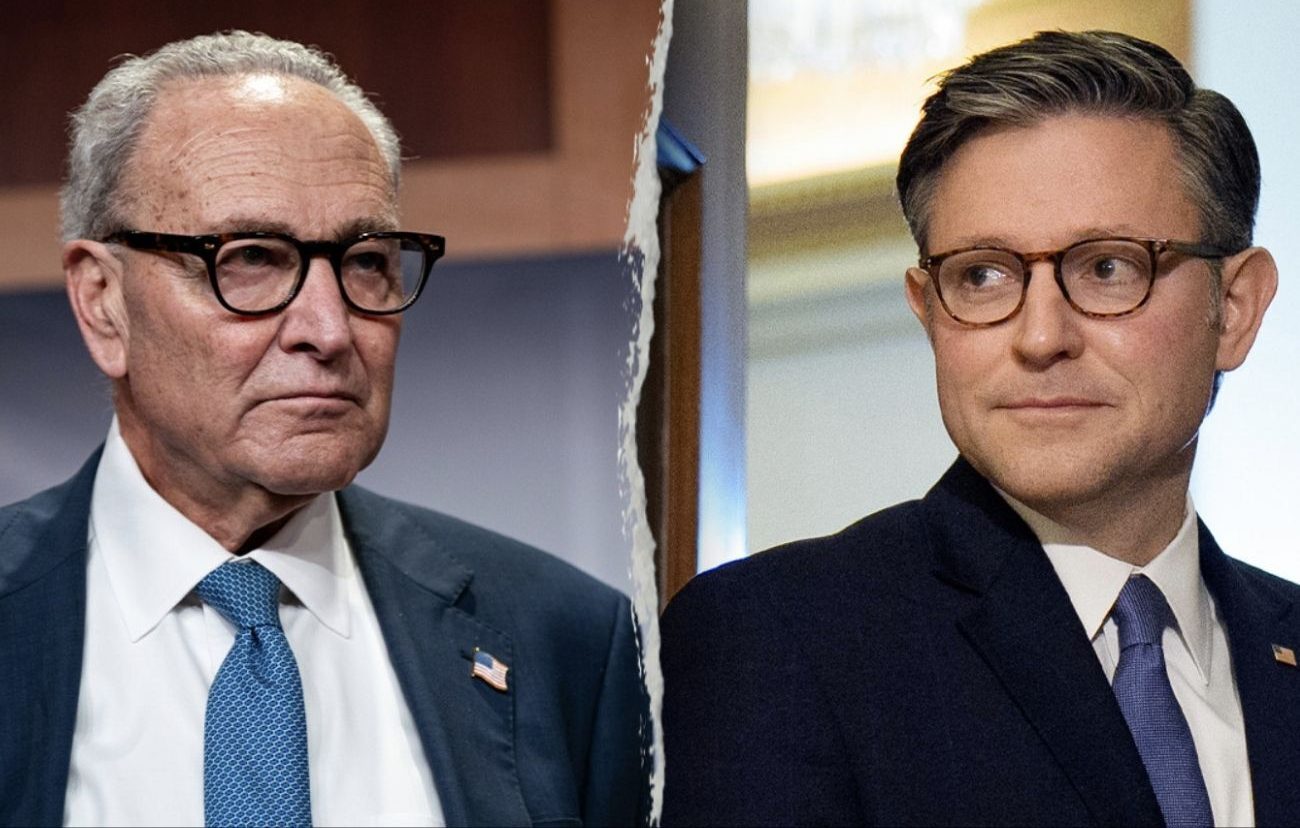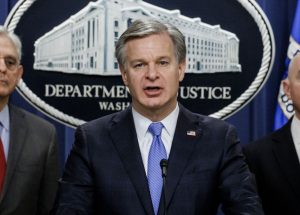House Speaker Mike Johnson (R-La.) publicly criticized Senate Minority Leader Chuck Schumer (D-N.Y.) on Friday over what he described as a troubling plan to prolong the ongoing federal government shutdown until after a left-wing rally scheduled for October 18 in Washington, D.C.
The remarks from Johnson, made during an appearance on Fox & Friends, signal the growing frustration among Republicans as the standoff between the parties stretches into its third week, leaving hundreds of thousands of federal workers without pay and stalling nonessential government services.
“I’m normally a patient guy, but I have HAD it with these people. They’re playing games with real people’s lives,” Johnson said, his tone reflecting deep frustration with Democratic leadership.
According to Johnson, Democrats have signaled they will not agree to reopen the government until the “No Kings” rally in the nation’s capital concludes. The event, which Johnson characterized as a “Hate America rally,” is reportedly drawing left-wing groups, including pro-Hamas and Antifa sympathizers, and has become a focal point in ongoing political debates over party priorities.
“It’s being told to us they can’t reopen the government until after that rally, because they can’t face their rabid base!” Johnson said.
Schumer’s remarks ignite backlash
The controversy follows a separate set of comments by Schumer this week, in which he reportedly claimed that the ongoing government shutdown was politically advantageous for Democrats. According to Punchbowl News, Schumer told colleagues, “Every day gets better for us,” asserting that Democrats had anticipated the shutdown’s fallout and were prepared to capitalize on it politically.
The Senate Minority Leader’s remarks specifically referenced Democrats’ push to restore health care funding for undocumented immigrants — a measure opposed by Republicans, who have framed the policy as “reckless and unfair to taxpayers.” Schumer reportedly said,
“We knew that health care would be the focal point on Sept. 30… Their whole theory was — threaten us, bamboozle us, and we would submit in a day or two.”
Those comments immediately drew bipartisan condemnation and fueled growing outrage among federal employees, conservative lawmakers, and the Trump administration.
White House and Republican response
Deputy Press Secretary Abigail Jackson called Schumer’s remarks “disgusting and revealing,” accusing the Senate Minority Leader of taking pleasure in the hardships faced by ordinary Americans.
“Workers are missing paychecks; travelers are missing flights; businesses are struggling; military families are forced to rely on food pantries. But to Chuck Schumer, that means ‘every day gets better.’ No matter what he thinks, Americans struggling is not good — and Democrats must stop inflicting this pain on them and reopen the government now,” Jackson said in a statement to Fox News Digital.
White House Press Secretary Karoline Leavitt echoed the criticism in a post on X, noting that Schumer’s comments underscore Democratic leadership’s priorities.
“While federal workers stress over missed paychecks, military families turn to food pantries, and airports face delays — Chuck Schumer and the Democrats are bragging that ‘every day gets better’ for them. What a disgusting and revealing statement,” Leavitt wrote.
President Donald Trump also weighed in during a Thursday Cabinet meeting, framing the situation as an intentional standoff by Democrats to advance their political agenda.
“Chuck Schumer and Hakeem Jeffries and the Congressional Democrats are holding the entire federal government hostage. He’s terrified AOC is going to run against him, and she probably will. His numbers are terrible — I don’t think he makes it another term,” Trump said.
Shutdown drags on
The ongoing federal shutdown, now entering its third week, has left hundreds of thousands of federal employees furloughed or working without pay. Economic analysts estimate the stoppage has cost the U.S. economy up to $2 billion per week in lost productivity and delayed federal contracts.
Key federal services, including national parks, passport processing, and parts of the Social Security Administration, have been disrupted. Military families relying on commissary services or housing allowances have also reported difficulties amid ongoing budget uncertainties.
Political calculus behind the shutdown
According to Republican leadership, Schumer’s strategy is part of a broader attempt to placate progressive members of his party, including rising figures like Rep. Alexandria Ocasio-Cortez (D-N.Y.), who is widely rumored to be considering a 2026 Senate primary challenge against Schumer. Internal GOP sources suggest that Democrats see the shutdown as a means to demonstrate that Republicans are “unwilling to negotiate” and to energize the party’s base ahead of the midterm elections.
“They’re playing a game of political chicken at the expense of ordinary Americans,” a senior GOP aide told Conservative Brief.
Johnson, who has positioned himself as a pragmatist willing to negotiate in good faith, framed the situation as an unacceptable gamble with real human costs.
“They have a Hate America rally scheduled for Oct. 18 on the National Mall. Pro-Hamas, Antifa people, they’re all coming out. House Democrats selling T-shirts for the event. And they’re telling us we can’t reopen the government until after it? That’s not leadership — that’s hostage-taking,” Johnson said.
https://twitter.com/ConservBrief/status/1976627213773476296
The Democratic defense
Schumer’s office has defended his comments, arguing that Republicans are primarily responsible for the impasse due to an unwillingness to compromise on budget priorities. A spokesperson provided a portion of Schumer’s Senate floor remarks claiming the Democratic Party has consistently attempted to negotiate reopening measures.
“We have repeatedly presented plans to reopen the government, but Republicans continue to block action unless we abandon funding for essential programs,” the spokesperson said.
Despite these statements, internal Democratic communications reportedly show deep concern that the party is being politically boxed in by its progressive wing, especially as left-leaning activists push for expanded social programs and immigration initiatives.
Growing tension inside Congress
As the shutdown continues, tensions have escalated not just between the parties but also within the Democratic caucus itself. Progressive Democrats are urging leadership to hold firm on funding for immigrant health care, while moderates express concern about the political and economic fallout of a protracted government closure.
Republicans, meanwhile, have coalesced around Johnson’s hardline approach, arguing that Schumer’s strategy is jeopardizing the well-being of ordinary Americans for short-term political gain.
“This isn’t about policy; it’s about politics,” one GOP strategist said. “They’re prioritizing a rally and their base over the livelihoods of federal employees, small businesses, and travelers across the country.”
Impact on the public and economy
Beyond the political theater, the human and economic toll is mounting. Reports from federal employee unions indicate that many workers are struggling to pay rent, mortgages, and daily expenses. Airports and transportation hubs are experiencing delays due to furloughed air traffic and security personnel, while small businesses reliant on government contracts face uncertainty over payment and project timelines.
Economists warn that a shutdown of this duration could slow economic growth, raise borrowing costs, and diminish consumer confidence heading into the holiday season.
“Even a short-term shutdown ripples through the economy,” said Dr. Laura Higgins, a policy analyst at the American Enterprise Institute. “Payroll disruptions, delayed services, and stalled contracts all translate into real financial stress for families and businesses alike.”
Looking ahead
Negotiations are expected to resume this week, though both sides remain deeply entrenched in their positions. Lawmakers on both ends of the political spectrum acknowledge that a resolution will require compromise, but the broader political stakes, including looming elections and internal party pressures, suggest that a quick fix may remain elusive.
Meanwhile, the October 18 rally looms as a symbolic and tactical flashpoint for Democrats, further complicating the prospects for an agreement. Observers suggest that even if the rally passes without incident, the standoff may continue as both parties seek leverage for the midterm elections.
Conclusion
The escalating clash between Johnson and Schumer over the government shutdown exemplifies the growing polarization and strategic brinkmanship in Congress. With federal workers, military families, and the economy caught in the middle, the standoff highlights how political considerations can sometimes eclipse governance — with potentially lasting consequences for public trust and institutional stability.
As the nation watches, the decisions made in the coming days will not only affect immediate government operations but could also set the tone for legislative and electoral battles in 2026.

James Jenkins is a celebrated Pulitzer Prize-winning author whose work has reshaped the way readers think about social justice and human rights in America. Raised in Atlanta, Georgia, James grew up in a community that instilled in him both resilience and a strong sense of responsibility toward others. After studying political science and creative writing at Howard University, he worked as a journalist covering civil rights issues before dedicating himself fully to fiction. His novels are known for their sharp, empathetic portraits of marginalized communities and for weaving personal stories with broader political realities. Jenkins’s breakout novel, Shadows of Freedom, won national acclaim for its unflinching look at systemic inequality, while his more recent works explore themes of identity, resilience, and the fight for dignity in the face of oppression. Beyond his novels, James is an active public speaker, lecturing at universities and participating in nonprofit initiatives that support literacy and community empowerment. He believes that storytelling is a way to preserve history and inspire change. When not writing, James enjoys jazz music, mentoring young writers, and traveling with his family to explore cultures and stories around the world.









